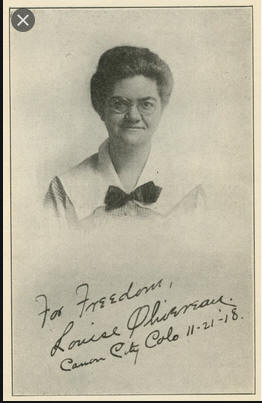

 Louise
Olivereau (1884 - March 11, 1963) was a Seattle anarchist, poet and teacher;
Emma Goldman called her ”An
idealist of the finest type of American womanhood”; she worked at the Ferrer
Modern Day School in Portland, and for the I.W.W. in Seattle; she helped
organize Goldman’s lectures in Portland. She served two years in prison for
anti-conscription activism, and corresponded with Goldman in Jefferson City
Prison when Olivereau was in Canyon City, CO. She contributed to Mother
Earth Bulletin after Goldman was imprisoned and Mother Earth
closed down.
Louise
Olivereau (1884 - March 11, 1963) was a Seattle anarchist, poet and teacher;
Emma Goldman called her ”An
idealist of the finest type of American womanhood”; she worked at the Ferrer
Modern Day School in Portland, and for the I.W.W. in Seattle; she helped
organize Goldman’s lectures in Portland. She served two years in prison for
anti-conscription activism, and corresponded with Goldman in Jefferson City
Prison when Olivereau was in Canyon City, CO. She contributed to Mother
Earth Bulletin after Goldman was imprisoned and Mother Earth
closed down.
Louise Olivereau was the daughter of immigrants, with a French father,
a minister, and a German mother. She was born around 1884 in Wyoming and
educated as a stenographer at what later became Illinois State University.
She worked in resort camps as a cook. An anarchist and poet, she acted as
assistant to William Thurston Brown in setting up a Modern Schol in
Portland, run on the principles of Francisco Ferrer. In March 1915 she and
H.C. Uthoff set up the Portland Birth Control League, holding meetings and
distributing literature, following local agitation by Emma Goldman. She
moved to work as a stenographer in the offices of the Industrial Workers
of the World (IWW) in Seattle later in the year.
When the United
States went to War on the side of the Allies in 1917, Congress passed The
Espionage Act in June of that year, making it a crime to incite
insubordination in the armed forces, to obstruct the recruitment of
soldiers, and to use the mails to do so. The IWW took an anti-war
position, and already targeted by the authorities because of their
agitation among workers, now became seen as even more of a threat.
In August 1917, Olivereau spent $40 of her own money (she only earned
around $15 dollars a week) to mimeograph and post letters and circulars
encouraging young men to refuse the draft and become conscientious
objectors. On September 5, 1917, Bureau of Investigation agents, raided
the Seattle IWW and confiscated literature.


Two days later, Olivereau went to the agents' office to retrieve her
property. The agents attempted to get Olivereau to admit that the IWW was
behind the circulars, but she insisted that she acted alone. They went
with her to her home where they confiscated more documents and then
arrested her. She later said that she had told the agents that “if out of
2,000 circulars I could persuade five men to consider the connection
between the individual and government and war, I would consider myself
quite successful”.
Olivereau was indicted on three counts of
violation of The Espionage Act in connection with a letter and circular
posted to one man in Bellingham. At the trial, she defended herself,
saying that an attorney "would worry more over getting me a light sentence
than over the preservation of the ideals I care for more than for my own
liberty."
In court she readily admitted her actions, defended her
concept of Anarchism and described the American government as an apparatus
to protect the property of the rich. The jury convicted Olivereau and the
judge sentenced her to 10 years in prison on November 30th 1917. He
finished by declaring Miss Olivereau a woman above the average in
intelligence, and hoped she would change her ideas to conform to organized
government.
She served 28 months in the state penitentiary in Cañon
City, Colorado, before being paroled. The first year she was not allowed
to receive any letters, magazines or newspapers.The IWW provided no
support for Olivereau or her case because of her openly professed
allegiance to anarchism in court. Her case was hardly mentioned in IWW
newspapers and no other IWW member attended her trial. Only
Anna Louise Strong,
whom she knew from her visits to the IWW offices, appeared in court to
support her. As a result she lost her job with the Seattle School Board
and subsequently started working as a radical journalist.
Despite
this, Olivereau , once the ban on newspapers was lifted, always looked
forward to receiving IWW newspapers in jail. She ran classes in prison
teaching other prisoners English.
Released in March 1920, Olivereau
stayed with a friend in Portland, Oregon, where she spoke to union
meetings and women’s clubs, distributed pamphlets and supported herself
with secretarial work. She spoke to Finnish workers in Portland on May
Day. She planned on giving the proceeds of her meetings to support the
movement in Mexico inspired by the anarchist Ricardo Flores Magon. She got
a job as a stenographer but was disgusted that as an anarchist she had to
type out a book on accounting. When she told the boss that he should give
his workers a pay rise she was sacked. She then was contemplating,
according to the last letter she wrote to friends in the movement, looking
to work in a delicatessen or a café. These last few letters of hers reveal
her sadness at the way so many of her old friends would have nothing to do
with her because of her anti-war stance. She now disappeared into
obscurity, continuing to work at a variety of clerical and sales jobs in
Oregon and California. She settled in San Francisco in 1929 and worked as
a stenographer. She died there on March 11th 1963.
My published books: